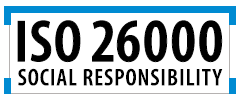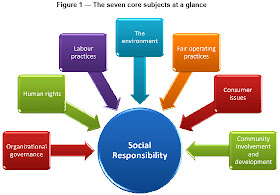Corporate Social Resposibility (CSR) integrated into business conduct has recently been gaining increasing amounts of attention. There is no clear evidence being measured to determine how much each organization has embraced its responsibility to society. The International Organization for Standardization (ISO) has developed a social responsibility guidance standard called “ISO 26000” and plans toe formally release a complete version of the ISO 26000 guidance standard in the middle of 2010. To be well prepared for the final standard publication, this issue of “Manufacturing Tip” presents topics for ways to primarily evaluate how much your organization has come across the boundary of the ISO 26000 guidance standard.
The ISO 26000 standard of social responsibility is a voluntary standard and guildance, is not a certification requirement, and is aimed to be an operationalizing program for Corportate Social Responsibility to organizations who decide to practice this standard. Prior to stepping up to operate by an international standard, the Department of Industrial Works established a standard called Corporate Social Responsibility Department to Industrial Works (CSR-DIW) referenced by ISO 26000, Working Draft 3rd issue (WD3) to prepare for the finalization of the ISO 26000 standard. We can follow the ISO 26000 guideline to develop organizations. There are seven core issues being addressed by the CSR-DIW standard that entrepreneurs should consider.
1. Organizational Govemance includes: an organizational structural management and a decision making process that operates in a responsible manner, which are transparency accountability. In addition to those manners, appropriate and effective application of financial, natural, and human resources promoted balance among the demands of organizations and stakeholders.
 2. Human Rights: Businesses should Inspect and evaluate the risk of every activity that could potentially violate human rights, to avoid joint wrongdoing that could harm human rights, and to solve problems from fair claims under the principles for righteousness, reason, equality, and clearness. Entrepreneurs should provide special treatment for females, handicapped people, children, native people, and refugees and should respect human rights relevant to politics, education, economics, societies, religions, and cultures.
2. Human Rights: Businesses should Inspect and evaluate the risk of every activity that could potentially violate human rights, to avoid joint wrongdoing that could harm human rights, and to solve problems from fair claims under the principles for righteousness, reason, equality, and clearness. Entrepreneurs should provide special treatment for females, handicapped people, children, native people, and refugees and should respect human rights relevant to politics, education, economics, societies, religions, and cultures.3. Labour: Practice is to provide legitimate employment by establishing employment agreements with legally accepted organizations, provide an equal employment opportunity for all employees, provide fair compensation, provide safely and hygiene at workplaces, and constantly arrange training to develop employee’s capability.
 4. Environment: Businesses should determine preventive measures in generating pollution, disclose the type and volume of toxins emitted into the biosphere, effectively promote lasting and renewable resource consumption, decrease the impact from climate change, and restore the nature by implementing preventive procedures.
4. Environment: Businesses should determine preventive measures in generating pollution, disclose the type and volume of toxins emitted into the biosphere, effectively promote lasting and renewable resource consumption, decrease the impact from climate change, and restore the nature by implementing preventive procedures.5. Fair operating practice: addresses the areas o f anti-corruption, responsible political cooperation, fair competition among rivals, the promotion of social responsibility for organizational stakeholders, and the respect of intellectual property rights.
6. Consumer issues: providing data of merchandise price, providing quality inspection reports and actual warrantee conditions, acting under a fair agreement to consumers, issuing preventive safety and hygiene measures for consumers, promoting consumption of environmentally friendly products, using recycled packaging, determining preventive measures, resolving disputes among consumers by lengthening warrantee periods to be more than the one imposed by law, protecting consumer’s privacy rights, and maintaining and improving systems constantly to prevent service from being paused.
7. Community involvement and development: is to consult with community representatives in running community development projects, to promote academic quality development and people skills in the community, to preserve and guard the local cultural heritage, to develop technologies for communities, to build jobs for a source of income for communities, to promote access to basic health services that are necessary, and to invest in useful projects for communities.




The International Organization for Standardization ( ISO) 26000 was founded in 2010 to direct social responsibility organisations. Know more: ISO 26000
ReplyDeleteWe are really grateful for your blog post. You will find a lot of approaches after visiting your post. I was exactly searching for. Thanks for such post and please keep it up. Great work. IEC Standards
ReplyDeleteI really appreciate the effort you put into creating such informative content. Your blogs are always a great resource. Keep inspiring! By the way, if anyone requires Internal Audit service, I’d be glad to assist. Looking forward to more great posts from you!
ReplyDeleteThanks for sharing such a informative blog related to professional solid waste management license click on it.
ReplyDeleteGreat article! It’s amazing how effective and accessible legal advisory services can simplify complex setups.
ReplyDelete👉 Learn more about Tyre Pyrolysis Plant Cost in India — 📞 Call Now!